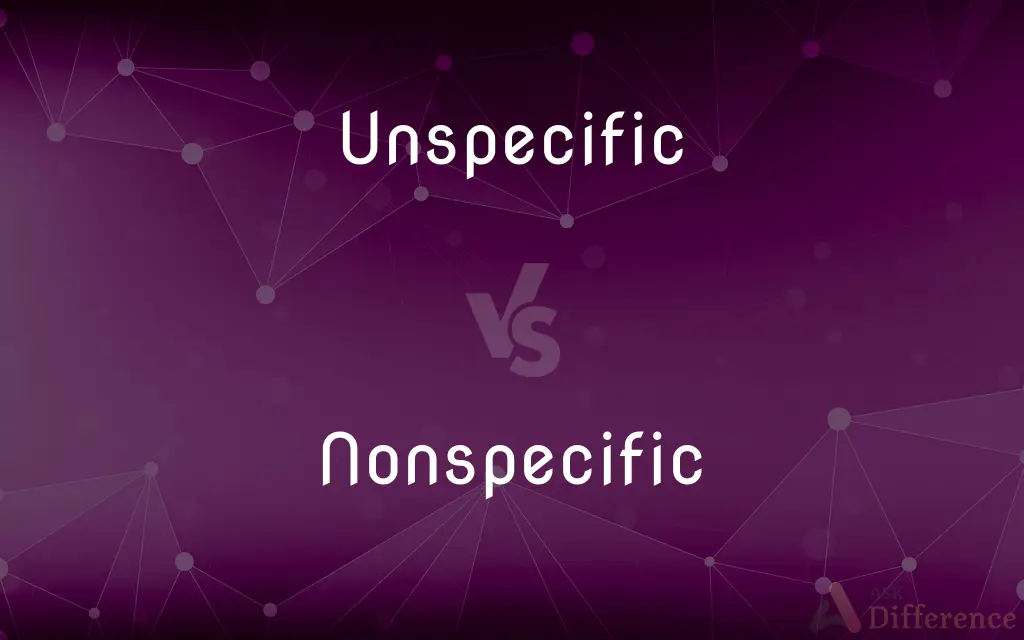Unspecific vs. Nonspecific — What's the Difference?
Edited by Tayyaba Rehman — By Fiza Rafique — Updated on April 16, 2024
"Unspecific" generally refers to a lack of specificity in a broad sense, while "nonspecific" often denotes a lack of unique or distinctive attributes, especially in scientific contexts.

Difference Between Unspecific and Nonspecific
Table of Contents
ADVERTISEMENT
Key Differences
The term "unspecific" is commonly used to describe something that is not detailed or precise in any general situation. Whereas, "nonspecific" is typically employed in medical or scientific contexts to indicate that a symptom, condition, or response is not unique to a particular disease or phenomenon.
"Unspecific" can imply a deliberate avoidance of detail, perhaps to maintain privacy or simplicity in communication. On the other hand, "nonspecific" may suggest an inherent lack of distinct features, which can complicate diagnosis or analysis in fields like medicine or biology.
In everyday language, "unspecific" might be used to refer to vague plans or descriptions. In contrast, "nonspecific" is more likely to be used when referring to broad-spectrum medications or tests that are not targeted at a specific condition.
When it comes to guidance or instructions, "unspecific" can be frustrating due to its lack of clear direction. Whereas "nonspecific" in scientific research might indicate a need for further specificity to refine results or hypotheses.
Literature might criticize a narrative as "unspecific" if it lacks vivid descriptions or particularities that give depth to the story. Conversely, a "nonspecific" immune response refers to the body's general defense mechanisms that are not tailored to a specific pathogen.
ADVERTISEMENT
Comparison Chart
Usage Context
General, broad usage
Often scientific, particularly in medicine
Connotation
Lacks detail, vague
Lacks distinctive features, broadly applicable
Common Associations
Communication, descriptions, plans
Symptoms, responses, conditions
Implication in Usage
Deliberate avoidance of detail
Inherent absence of unique characteristics
Example in a Sentence
"The instructions were unspecific."
"The test results were nonspecific."
Compare with Definitions
Unspecific
Not clearly defined.
His answer was unspecific, leaving us with many unanswered questions.
Nonspecific
Not specific to any one thing.
The medication has nonspecific effects, making it useful for multiple ailments.
Unspecific
Broad and generalized.
The meeting covered unspecific goals that applied to various departments.
Nonspecific
Universal or common.
Nonspecific complaints are often the hardest to resolve effectively.
Unspecific
Indeterminate.
The timeline provided was unspecific and flexible.
Nonspecific
Broadly effective or applicable.
The test is designed to detect nonspecific markers of disease.
Unspecific
Lacking in detail.
The guidelines were unspecific, making it hard to understand the requirements.
Nonspecific
Lacking unique characteristics.
Nonspecific symptoms can be challenging to diagnose.
Unspecific
Vague in nature.
Her description of the event was unspecific and unhelpful.
Nonspecific
General in action or effect.
The policy addresses nonspecific issues within the industry.
Unspecific
Not specific: nonspecific.
Nonspecific
Of or relating to an infection not known to be caused by a specific pathogen
Nonspecific urethritis.
Unspecific
Not detailed or specific;
A broad rule
The broad outlines of the plan
Felt an unspecific dread
Nonspecific
Of or relating to immunity that occurs naturally as a result of a person's genetic makeup or physiology and does not arise from a previous infection or vaccination.
Nonspecific
Not specific or precise, as:
Nonspecific
Or other finding}} Not specific to one possible cause#Noun; caused by any of various possible causes.
Nonspecific
Not specific to one pathogen; affecting multiple strains or species#Noun of pathogen.
Nonspecific
Not known to be caused by any specific pathogen.
Nonspecific
Not caused by previous infection or vaccination, and/or affecting more than one antigen.
Nonspecific
That does not just stain#Verb one type of tissue.
Nonspecific
Not caused by a specific agent; used also of staining in making microscope slides;
Nonspecific enteritis
Quinine is highly specific for malaria
A specific remedy
A specific stain is one having a specific affinity for particular structural elements
Common Curiosities
What is the primary context for using "unspecific"?
Unspecific is mainly used in general contexts where details are lacking or deliberately omitted.
What is the primary context for using "nonspecific"?
Nonspecific is predominantly used in scientific or medical contexts to describe general or common characteristics that are not unique.
Can "unspecific" and "nonspecific" be used interchangeably?
While sometimes interchangeable, "unspecific" is better for general vagueness, and "nonspecific" for lack of unique features, especially scientifically.
How does "unspecific" affect understanding?
It can lead to confusion or ambiguity due to the lack of clear information.
Does "nonspecific" imply a lack of knowledge?
Not necessarily; it might rather imply a wide range of applicability or relevance.
Why might someone use "unspecific" in communication?
To maintain privacy, simplify explanations, or because they lack precise information.
What are examples of "unspecific" use in everyday life?
Vague plans like "Let's meet sometime this week" are examples of using "unspecific" in daily conversations.
What are examples of "nonspecific" use in professional settings?
In a clinical setting, describing symptoms like fatigue as "nonspecific" because they occur in many conditions.
Why is "nonspecific" important in medicine?
It helps in understanding that certain symptoms or tests are not limited to one condition, which can guide broader diagnostic or treatment strategies.
What implications does "nonspecific" have in research?
Indicates a need for more targeted studies to identify specific factors or outcomes.
How should one adjust communication when something is "unspecific"?
Seek or provide more details to clarify the intended message.
How do "unspecific" and "nonspecific" impact decision-making?
Both can complicate decision-making; "unspecific" by lacking clarity, and "nonspecific" by being too broad.
What steps might a scientist take when dealing with "nonspecific" findings?
Further research to narrow down the specifics or develop more targeted tests.
Can "unspecific" imply intentionality?
Yes, it can imply that details are omitted on purpose.
How do the implications of "unspecific" and "nonspecific" differ in practical terms?
"Unspecific" often relates to communication challenges, whereas "nonspecific" relates to challenges in scientific identification or treatment.
Share Your Discovery

Previous Comparison
Herein vs. Hereof
Next Comparison
Origin vs. OriginalAuthor Spotlight
Written by
Fiza RafiqueFiza Rafique is a skilled content writer at AskDifference.com, where she meticulously refines and enhances written pieces. Drawing from her vast editorial expertise, Fiza ensures clarity, accuracy, and precision in every article. Passionate about language, she continually seeks to elevate the quality of content for readers worldwide.
Edited by
Tayyaba RehmanTayyaba Rehman is a distinguished writer, currently serving as a primary contributor to askdifference.com. As a researcher in semantics and etymology, Tayyaba's passion for the complexity of languages and their distinctions has found a perfect home on the platform. Tayyaba delves into the intricacies of language, distinguishing between commonly confused words and phrases, thereby providing clarity for readers worldwide.














































